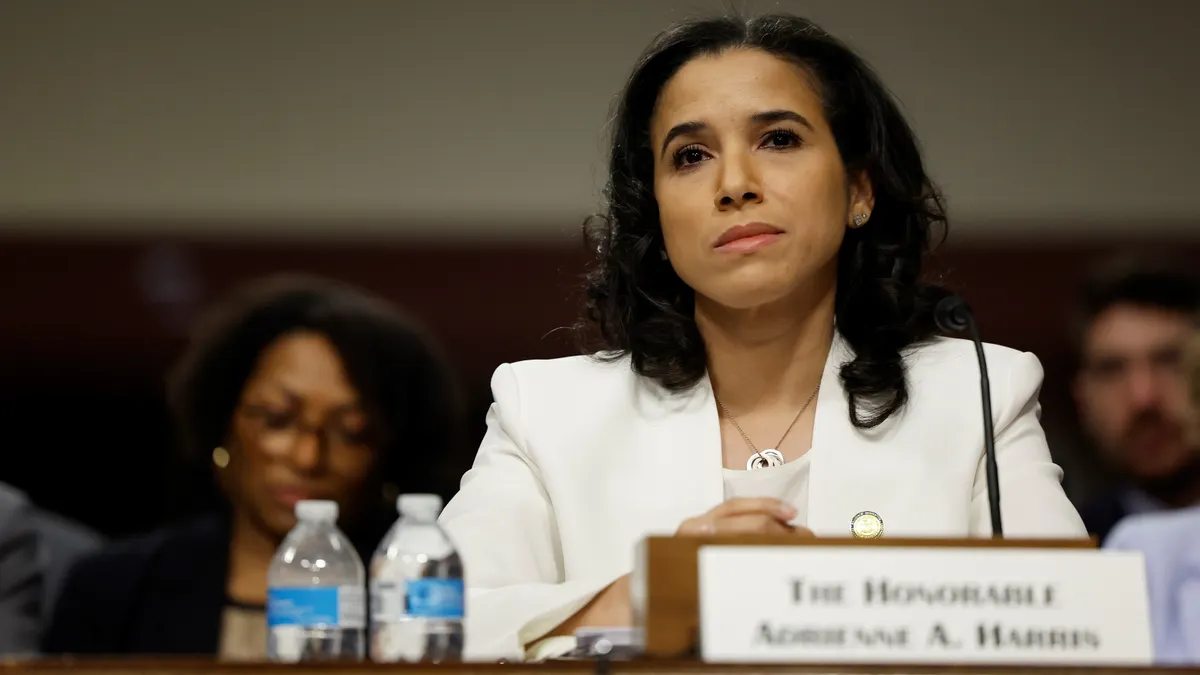New York financial regulators have begun discussions with BNPL providers and others to formulate new rules for the buy now, pay later industry, the state’s top financial regulator told a fintech panel last week.
“We’re accomplishing a number of objectives, all at the same time, making a rule that is fair and balanced, based on data and evidence, so that it can be a good rule for industry and for consumers,” said Superintendent Adrienne Harris of the New York Department of Financial Services.
She spoke Wednesday at the Financial Technology Association’s annual CEO Summit in Washington D.C.
Buy now, pay later providers have expressed their displeasure with the New York BNPL Act, which Gov. Kathy Hochul signed on May 9.
The law imposes a new licensing requirement for BNPL providers, and limits interest and fees on point-of-sale installment financing it labels as “loans.” BNPL providers have battled against subjecting their services to the same laws that apply to credit card loans.
The New York law also requires BNPL companies to devise a framework in New York for handling unauthorized charges and resolving disputes.
About 8% of all U.S. e-commerce transactions involve BNPL use, with $1 billion tallied last December on the post-Thanksgiving U.S. “Cyber Monday” shopping day, Harris said in a discussion with Penny Lee, the FTA’s president and chief executive.
The BNPL industry needs “guardrails to make sure that everybody has transparency around credit reporting, around disclosures, around fees,” she said. “And so that’s what we’re going to do in our rulemaking.”
The department has already begun to engage with the industry and other regulators to discuss the rulemaking, Harris said.
The New York law gives DFS regulators “broad discretionary rulemaking authority,” Husch Blackwell attorneys Susan Seaman and Cat Albrecht-Wiese wrote Wednesday in a legal update.
The act also requires state-chartered banks to obtain written authorization from New York regulators before they can become a BNPL lender for specific types of loans, the attorneys wrote. The new law will be effective six months after the DFS issues its regulation on implementing the statute.
“The New York BNPL Act is not only an example of a state ‘filling in the gaps’ for a less-active CFPB,” they wrote, but “also demonstrates the lingering influence that non-rulemaking guidance issued by the CFPB under Director Rohit Chopra could have on states’ legislative and regulatory agendas.”
In March, the Consumer Financial Protection Bureau said it would rescind a rule interpretation affording consumer protections to BNPL loans that was promulgated during the Biden administration.
The FTA sued the CFPB in October 2024, arguing that the bureau’s BNPL interpretative rule exceeded the agency’s authority and wrongly sought to place BNPL loans into the same category as credit card lending. Earlier this month, the agency told the court overseeing the lawsuit that it doesn’t intend to issue a new BNPL rule.
On a separate topic – cryptocurrency and the status of federal legislation devising a regulatory framework for stablecoins – Harris said she hopes Congress adopts a dual regulatory system as used for the banking industry, giving states a role.
“In our view, it would be a real shame if there wasn’t a state licensing pathway,” she said, noting New York’s experience overseeing cryptocurrency firms since 2015. “Why would you want to wipe out all that expertise and not leave a meaningful state pathway? So I think that’s the crux of a lot of our feedback.”
In the FTA discussion, Harris also was asked about how her department has sought to respond and operate differently, given the CFPB’s dramatically diminished role under the second Trump administration.
She said nothing has changed about New York’s regulation because of the CFPB’s dismantlement under Acting Director Russell Vought.
“There is no place for ideology in financial regulation,” Harris said. “For us in New York, we really pride ourselves on calling balls and strikes … for being data-based, for being evidence-based, and proving out the thesis that you can protect consumers and markets and be good for business.”
Those policy objectives are not “mutually exclusive,” but rather “mutually reinforcing,” she said.
The CFPB eliminating roughly 95% of its staff has carried one upside for New York: “A nice recruiting opportunity, I’m not going to lie,” Harris quipped.
“We’ve been very forward leaning on recruiting,” she said. “My new head of enforcement came from the CFPB, so we’re not going to lie – that’s a nice benefit for us in New York.”
Correction: The story has been updated to correct BNPL providers' view that their services are loans.














